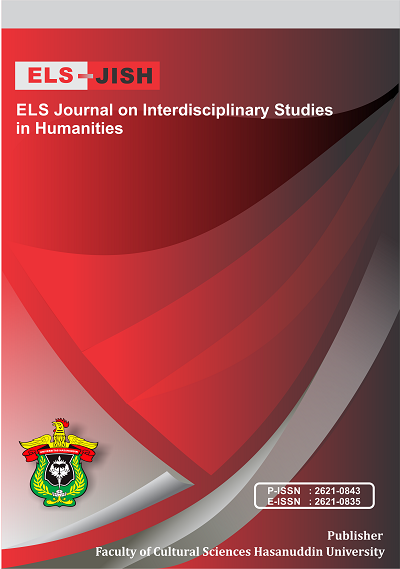An Analysis of Code-Switching by College Students in Makassar
DOI:
https://doi.org/10.34050/els-jish.v7i4.42024Keywords:
Code-switching, Bilingualism, College students, Language use, Makassar, MultilingualismAbstract
This study examines code-switching among college students in Makassar, Indonesia. Code-switching, defined as the practice of alternating between two or more languages in a single conversation, is a common phenomenon in bilingual and multilingual communities. With the increasing influence of English in Indonesian education, students frequently switch between Indonesian and English. This research aims to identify the types of code-switching, understand its functions, and explore the reasons behind this linguistic behavior among college students. Data were gathered through recorded conversations and semi-structured interviews with 50 participants from different universities in Makassar. The results show that intra-sentential code-switching is the most prevalent, and the practice is influenced by social context, language proficiency, and exposure to digital media. This study provides significant insights into the bilingual language practices of college students in Makassar, specifically highlighting how code-switching serves as a dynamic tool for social interaction, identity negotiation, and academic expression. The findings contribute to a deeper understanding of bilingual practices in Southeast Asia and provide practical insights for educators, suggesting that embracing multilingualism in academic contexts can create more inclusive and effective learning environments.
References
Alim, S. H. (2022). The impact of social media on language practices: New media and multilingualism. Language in Society, 51(3), 443-463.
Al-Obaydi, L. H., Jawad, Z. A., & Rahman, F. (2022). Class-home Connection Using Communication Technology and its Impact on Anxiety Reduction and Academic Performance. Al-Adab Journal, (141), 53-66.
Braun, V., & Clarke, V. (2022). Thematic analysis: A practical guide. SAGE Publications.
Chong, K. L., & Lee, W. K. (2021). Code-switching as a marker of social identity among youth in Singapore. Journal of Sociolinguistics, 25(2), 178-199.
Hartono, J. (2023). Digital culture and language practices in Indonesian millennials. Asian Journal of Communication, 33(1), 112-130.
Kim, S., & Hartanto, A. (2021). The role of English in multilingual education: Globalization and digital communication in Indonesia. Language and Education, 35(4), 290-306.
Kim, S., & Hartanto, A. (2022). The role of English in multilingual education: Globalization and digital communication in Indonesia. Language and Education, 35(4), 290-306.
Myers-Scotton, C. (2023). The social motivations for code-switching: Perspectives from sociolinguistics. Cambridge University Press.
Poplack, S. (1980). Sometimes I’ll start a sentence in Spanish y termino en español: Toward a typology of code-switching. Linguistics, 18(7-8), 581-618.
Poplack, S. (2021). Code-switching in bilingual communities: Linguistic and social perspectives. Oxford University Press.
Said, M. M., Rita, F., Weda, S., & Rahman, F. (2021). English Language Performance Development Through Extracurricular Activities at Faculty of Teacher Training and Education Tadulako University Palu. PalArch's Journal of Archaeology of Egypt/Egyptology, 18(08), 388-403.
Setiawan, S., & Zhang, H. (2023). Understanding multilingualism in the classroom: The role of code-switching in higher education. Journal of Language and Education, 13(1), 58-71.
Sukmawaty, Rahman, F. F., & Andini, C. (2022). Covid-19 Pandemic and Axiology of Communication: A Study of Linguistic Phenomena. IJISRT, 7(4).
Weda, S., Rahman, F., Samad, I. A., Gunawan, F., & Fitriani, S. S. (2022). How Millennials Can Promote Social Harmony through Intercultural Communication at Higher Education. Randwick International of Social Science Journal, 3(1), 231-243.
Yaumi, M. T. A. H., Rahman, F., & Sahib, H. (2023). Exploring WhatsApp as Teaching and Learning Activities during Covid-19/New Normal era: A Semiotic Technology Analysis. International Journal of Current Science Research and Review, 6(12), 7627-7634.
Yaumi, M. T. A. H., Rahman, F., & Sahib, H. (2024). Bridging Language and Technology through Semiotic Technology. International Journal of Social Science Research and Review, 7(1), 52-61.
Youngsun, K., Sosrohadi, S., Andini, C., Jung, S., Yookyung, K., & Jae, P. K. (2024). Cultivating Gratitude: Essential Korean Thankfulness Phrases for Indonesian Learners. ELS Journal on Interdisciplinary Studies in Humanities, 7(2), 248-253.
Zhang, Y., & Setiawan, S. (2023). Bilingual practices in Indonesian higher education: English as a tool for academic and social integration. Indonesian Journal of Linguistics, 20(2), 85-98.
Downloads
Published
How to Cite
Issue
Section
License
Copyright (c) 2024 Marwah Juwita Yusuf

This work is licensed under a Creative Commons Attribution-ShareAlike 4.0 International License.






